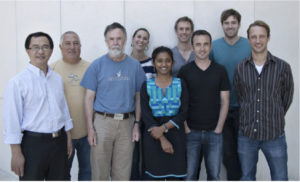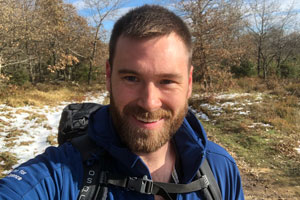Alumni Spotlight: Kyle Ellefsen
Maria Montchal sits down with Kyle Ellefsen, a recent UCI alumni, for a Q&A about his time at UCI and how it prepared him for a career outside academia.

The Parker Lab, UCI
What did you study in grad school?
I studied neuroscience. Dr. Ian Parker was my thesis advisor, and most of the research that went into my dissertation was directed at improving our understanding of how the ion channels that regulate intracellular calcium signal communicate with each other and with other components of calcium signaling pathways. I also did work on the development of tuning of visual cortical neurons, and had several other collaborations that didn't fit cleanly into my thesis. Imaging was my primary experimental technique, and a large proportion of my time was spent analyzing movies - writing code that extracted firing rates from movies of neurons firing, tracked fluorescently labeled proteins as they zipped around the cell, and detected tiny local increases in intracellular calcium.
What do you do now? What is a typical day like?
I'm currently a data scientist at the Bosch Center for Artificial Intelligence in Silicon Valley. A typical day starts with coffee with other data scientists and data engineers on my team (a tradition I've carried over from the Parker lab!). We work in groups of 2-3 on various consulting projects with other Bosch business units as clients. Projects usually last several months, and we usually work on two projects at a time. Projects move much more quickly in industry than academia, so I communicate daily with other team members and customers to discuss strategy. When we're stuck on a technical challenge it's pretty common for us to grab whoever looks the most distractible, go to a whiteboard and brainstorm possible solutions. The rest of the time is spent coding. There is a tight loop between coding a data pipeline or ML experiment, presenting results, and adjusting strategy. I've been at Bosch for 8 months and so far I've used machine learning techniques (random forests, SVMs, convolutional neural networks, logistic regression, gradient boosting, etc.) to automatically calibrate airbags, classify plastics by their spectra, detect and classify traffic signs, and detect raindrops on windshields. When there isn't a project deadline or big presentation coming up I usually work 9-5 Monday-Friday, although 10-12 hour days aren't too uncommon at crunch time. I spend a lot of time outside work studying machine learning, because switching fields requires a lot of knowledge acquisition, and because machine learning is so cool!
What did you do in/after grad school to prepare for your current career?
As a part of grad school, things that are now extremely useful include: giving presentations, organizing experimental pipelines, programming, communicating and project planning with collaborators, and spending many hours talking with Ian Parker, breaking down problems into their components and systematically devising plans to tackle them. Outside my grad school training, I spent quite a bit of time reading books about concept formation, logic, the philosophy of science, which were almost entirely tangential to my thesis but really led me to machine learning. Towards the end of grad school I applied and was accepted to Insight Data Science, a 7 week intensive training program that connected me with a lot of companies looking for people transitioning from academia. I got my current job about month after the end of that program.
What is your favorite part of your job?
The people are awesome. The vast majority of the team has PhDs in a wide variety of fields: e.g. physics, statistics, mathematics, computer science, neuroscience. The atmosphere is very academic. We have two study groups, a weekly machine learning club and a biweekly journal club. Everyone is encouraged to attend 1-2 conferences a year. I think largely because of everyone's academic background, the spirit of curiosity and continual learning is very much alive in at least this corner of industry.
What advice do you have for current grad students?
Your PhD experience frequently involves a balance between hard (high failure rate and meticulous, repetitive tasks) experimental work and intellectual development. Because in most labs there is a huge need for experimental work, it can be easy to exert more of your energy on experiments and lose that balance. The main purpose of grad school is to develop you into a more scientific thinker, not to train you to be a world-class mouse neurosurgeon. If your environment isn't conducive to your long-term goals, get out! There isn't any shame in changing your experimental strategy, changing your projects, or switching labs; I did all three. Talk to other grad students and postdocs about your trajectory to calibrate your relative progress. You (not your advisor or your program) are ultimately responsible for your academic growth!
Also, don't let six years in academia make you forget there is a big world outside of it, filled with passionate, creative, smart people doing exciting things!
Interview by Maria Montchal

Kyle Ellefsen
Kyle is a recent UCI Department of Neurobiology and Behavior alumnus, graduating in the spring of 2018 from Dr. Ian Parker's lab. Before graduating, he joined Insight Data Science in Silicon Valley, which helped him get a job as a data scientist at Bosch's Center for Artificial Intelligence. Since this interview, he left Bosch and hiked almost 300 kilometers of the Camino de Santiago (seen in the picture), before starting at Google as a Machine Learning Software Engineer.
